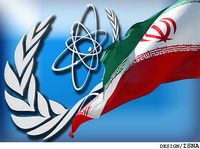Israel Says Nuclear Deal Allows Teheran to "Buy Time"
Thursday a senior Iranian lawmaker denied the idea of sending low-enriched uranium abroad for further processing.

The comment came a day after the U.N. nuclear watchdog presented a draft deal to Iran and three world powers for approval within two days to reduce Tehran's stockpile of enriched uranium, seen by the West as a nuclear weapons risk.
"They (the West) tell us: you give us your 3.5 percent enriched uranium and we will give you the fuel for the reactor. It is not acceptable to us," parliament's deputy speaker Mohammad Reza Bahonar was quoted as saying by ISNA news agency.
"The IAEA (International Atomic Energy Agency) is obliged to provide us with the fuel based on the safeguards," he said, Reuters reports.
It was also reported, Israel thinks a nuclear deal under negotiation with Iran benefits mainly the Islamic regime as it allows Teheran to "buy time" and gives the republic legitimacy to enrich uranium.
In Jerusalem, Prime Minister Binyamin Netanyahu convened his seven-member inner cabinet to mull Israel's strategy regarding the deal, which, if accepted by Iranian leaders, would delay Teheran's ability to make nuclear weapons by sending most of its known existing enriched uranium to Russia for processing, Jerusalem Post reports.
However, Iran's deputy parliament speaker Mohammad Reza Bahonar was quoted by the official IRNA news agency as saying Iran "doesn't accept" the offer, drummed up at a nuclear meeting in Vienna, Jerusalem Post reports.
In the meantime, China said on Thursday it welcomed progress achieved in Iran nuclear-fuel talks and the gradual implementation of the consensus reached in Geneva talks this month.
"We noticed that some progress has been achieved in Iran nuclear-fuel talks and we welcome the gradual implementation of the consensus in Geneva meeting," Ma said.
China would continue its constructive role in solving the Iranian nuclear issue through dialogue and negotiation, Xinhua reports.
Subscribe to Pravda.Ru Telegram channel, Facebook, RSS!





